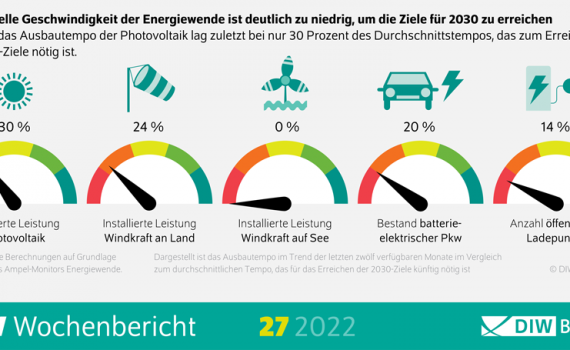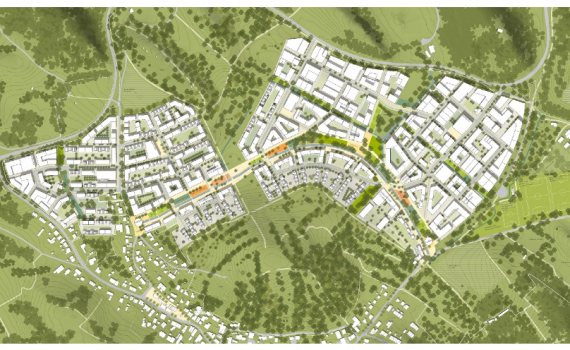Die EU-Staaten haben endgültig grünes Licht für die überarbeitete Richtlinie zur Energieeffizienz von Gebäuden gegeben und die neuen Vorgaben formell beschlossen. Kadri Simson, EU-Kommissarin für Energie, begrüßte das Votum: „Eine bessere Gesamtenergieeffizienz von Gebäuden ist von entscheidender Bedeutung, um unser Ziel der Klimaneutralität zu erreichen und die Energieunabhängigkeit Europas zu stärken. Renovierungen sind Investitionen in eine bessere Zukunft.“
Kategorie für Blog: Stakeholders
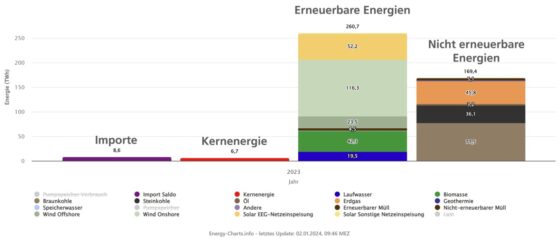 Net public electricity generation reached a record share of 59.7 per cent in 2023. The share of the load was 57.1 per cent. This is the result of an analysis presented today by the Fraunhofer Institute for Solar Energy Systems ISE. New records were set for wind and solar power in 2023. In contrast, generation from lignite (-27 per cent) and hard coal (-35 per cent) fell sharply. Photovoltaics stood out in the expansion of generation capacity: at around 14 gigawatts, the expansion was in double digits for the first time and significantly exceeded the German government's statutory climate protection target.
Net public electricity generation reached a record share of 59.7 per cent in 2023. The share of the load was 57.1 per cent. This is the result of an analysis presented today by the Fraunhofer Institute for Solar Energy Systems ISE. New records were set for wind and solar power in 2023. In contrast, generation from lignite (-27 per cent) and hard coal (-35 per cent) fell sharply. Photovoltaics stood out in the expansion of generation capacity: at around 14 gigawatts, the expansion was in double digits for the first time and significantly exceeded the German government's statutory climate protection target.
More rail transport, reformed motor vehicle tax and less fossil heating needed
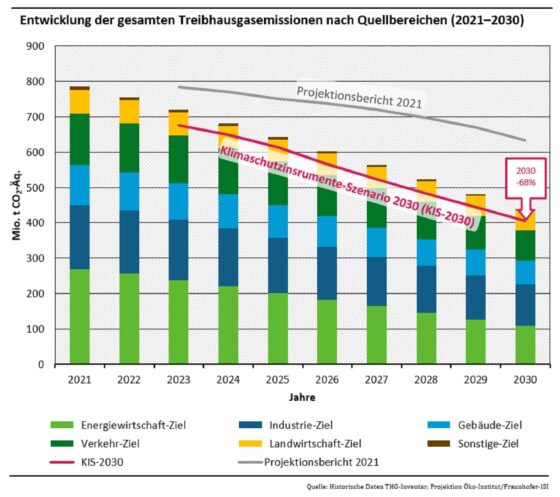 Germany can still achieve its climate targets by 2030. This is shown in a new analysis by the Federal Environment Agency (UBA). This would require, among other things, more rail transport, a reform of the motor vehicle tax and the restriction of fossil heating. In addition, all emissions would have to be priced and charged to the polluter. In the so-called Climate Protection Instruments Scenario 2030 (KIS-2030), the UBA has examined how additional emissions can be saved in the building, mobility, energy and industry sectors. "The model calculation clearly shows that we have a lot of catching up to do in some sectors," says UBA President Dirk Messner. "We now urgently need a constructive dialogue about where emissions can be reduced, otherwise we will miss the legal savings targets. We also need to talk honestly about how to cushion the financial burden on lower-income groups and distribute it more fairly. Currently, low-income households are often asked to pay disproportionately. Understandably, this does not exactly increase acceptance for more climate protection.
Germany can still achieve its climate targets by 2030. This is shown in a new analysis by the Federal Environment Agency (UBA). This would require, among other things, more rail transport, a reform of the motor vehicle tax and the restriction of fossil heating. In addition, all emissions would have to be priced and charged to the polluter. In the so-called Climate Protection Instruments Scenario 2030 (KIS-2030), the UBA has examined how additional emissions can be saved in the building, mobility, energy and industry sectors. "The model calculation clearly shows that we have a lot of catching up to do in some sectors," says UBA President Dirk Messner. "We now urgently need a constructive dialogue about where emissions can be reduced, otherwise we will miss the legal savings targets. We also need to talk honestly about how to cushion the financial burden on lower-income groups and distribute it more fairly. Currently, low-income households are often asked to pay disproportionately. Understandably, this does not exactly increase acceptance for more climate protection.
The Federal Cabinet today approved the draft of a timber construction initiative presented by Federal Minister of Construction Klara Geywitz and Federal Minister of Agriculture Cem Özdemir. This strategy of the Federal Government is intended to strengthen the use of wood as a sustainable raw material in the construction sector and to ensure more climate protection, resource efficiency and faster construction. With eight fields of action, from the exemplary role of the federal government and the strengthening of research and innovation, to securing skilled labour and knowledge transfer, to securing the supply of raw materials, the use of wood is to be significantly improved and the timber construction quota increased by 2030.
Scientific scenarios on climate neutrality support corporate strategy and planning on the path to decarbonisation - Using the example of buildings and heating, climate economists at DIW Berlin analyse existing scenarios on climate neutrality - Net zero scenarios show a clear path for the transformation of companies and the financial sector - With standardised scenarios and transition plans for climate neutrality, banks, funds and insurance companies can make their portfolios fit for the future.
Environmental crises jeopardise health. At the same time, an ecological change of direction offers many opportunities to create healthier living conditions. This is the core message of the special report that the Environmental Council is presenting to Environment Minister Steffi Lemke and Health Minister Prof Karl Lauterbach in Berlin today. The WHO estimates that 15 % of deaths in Europe are attributable to environmental risks. Health hazards arise, for example, from air pollutants, noise, chemicals and the spread of antibiotic resistance. New pressures, such as climate change and biodiversity loss, are also emerging.
On 16 June, the member states of the European Union approved a comprehensive revision of the EU Renewable Energy Directive (RED) in the Committee of Permanent Representatives. The European target for renewable energies will thus be significantly increased from the previous 32% to 45% in 2030. This means a doubling of the share of renewable energy compared to the level reached in 2021 of just under 22%. This is a great success for the expansion of renewables: It roughly doubles the planned expansion of renewable energy by 2030. To achieve the new targets, more than 100 GW of new wind turbines and solar installations will be installed in the EU every year. For Germany, this means that the significantly increased expansion targets for wind and solar energy in 2022 will be underpinned by European targets and become binding. The higher EU targets also form the framework for further measures and targets in the EU, such as the EU's solar strategy, which aims to roughly triple PV capacity to 600 GW by 2030.
PV strategy presented
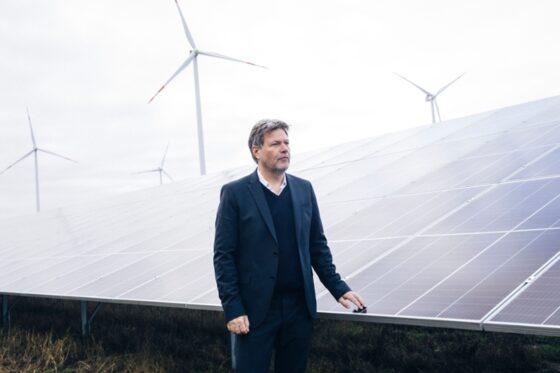 Today, Federal Minister of Economics and Climate Protection Robert Habeck presented the second PV-The aim is to significantly accelerate the expansion of solar energy in Germany. The goal is to significantly accelerate the expansion of solar energy in Germany. To this end, the strategy identifies measures in a total of eleven fields of action. The spectrum ranges from measures in the area of energy policy to the topics of securing skilled labour, industrial value creation in Europe and technology development. This was preceded by a first photovoltaic summit in March 2023. Since March, the PV strategy has been consulted. More than 600 comments were received.
Today, Federal Minister of Economics and Climate Protection Robert Habeck presented the second PV-The aim is to significantly accelerate the expansion of solar energy in Germany. The goal is to significantly accelerate the expansion of solar energy in Germany. To this end, the strategy identifies measures in a total of eleven fields of action. The spectrum ranges from measures in the area of energy policy to the topics of securing skilled labour, industrial value creation in Europe and technology development. This was preceded by a first photovoltaic summit in March 2023. Since March, the PV strategy has been consulted. More than 600 comments were received.Proven work aid and at the same time standard work for climate protection work in municipalities can be used digitally in future. Difu, ifeu and Climate Alliance developed the guide on behalf of the BMWK.
The bioeconomy can be a central building block for the transformation of our largely coal, oil and gas-based economy. However, renewable raw materials and synthetic carbon compounds are scarce and expensive. They should be used in areas such as the chemical industry - not as energy sources. For the shift from a fossil-based economy to a bioeconomy to succeed, fossil carbon must also become more expensive. The ifeu now presents the results of four trend-setting studies.
The housing shortage is an immense social problem in many large cities and conurbations. At the same time, the building sector has been failing to meet its environmental and climate targets for years. In a recent position paper, the Federal Environment Agency (UBA) and the Commission for Sustainable Building at the UBA (KNBau) have examined how more affordable housing can be created without unnecessarily harming the environment and health. According to this paper, the most important factor for more environmental protection in housing construction is that the existing building stock is preserved wherever possible or is sensibly converted and repurposed. This is the easiest way to avoid climate emissions and unnecessarily high consumption of raw materials. Today, UBA President Prof. Dr. Dirk Messner presented KNBau's proposals to Federal Minister of Building Klara Geywitz and Federal Minister of the Environment Steffi Lemke in Berlin.
 The Federal Ministry of Transport, Building and Urban Affairs is supporting the climate-friendly construction of new buildings with a new funding programme that will start on 1 March 2023. For the first time, the entire life cycle of a building will be considered - from construction to operation to potential deconstruction in the distant future. The buildings are characterised by low greenhouse gas emissions in the life cycle, high energy efficiency, low operating costs and a high proportion of renewable energies for the generation of heat and electricity. This funding thus makes a contribution to climate protection and to meeting national climate targets.
The Federal Ministry of Transport, Building and Urban Affairs is supporting the climate-friendly construction of new buildings with a new funding programme that will start on 1 March 2023. For the first time, the entire life cycle of a building will be considered - from construction to operation to potential deconstruction in the distant future. The buildings are characterised by low greenhouse gas emissions in the life cycle, high energy efficiency, low operating costs and a high proportion of renewable energies for the generation of heat and electricity. This funding thus makes a contribution to climate protection and to meeting national climate targets.
Adjusted for inflation, construction volume will decline in 2022 - Price development and rising interest rates will continue to have a severe impact on the construction industry in the years to come - New residential construction will slump more than the overall construction volume - Policymakers will have to change their strategy in order to achieve their goals for the creation of new housing and energy-efficient building renovation in the medium term
The first results of the timber housing study will be presented at the 15th Congress on Efficient Building with Wood in Urban Areas on 19 October 2022 in Cologne. So far, 118 large-volume housing projects with more than 100 units have been identified across Europe by the HFR researchers, 47 of which are located in Germany. Final results will be presented in early December at the 26th International Timber Construction Forum in Innsbruck on 30 November 2022 and will also be published in a brochure by Informationsdienst Holz.
The "Climate Adaptation Check" is a new orientation aid for NRW municipalities. The federal state passed the first climate adaptation law in Germany in 2021. The check supports NRW municipalities in implementing the new requirement for consideration. Berlin/Cologne. The consequences of climate change have long been felt in German municipalities: more frequent heavy rainfall events, flooding, storms as well as heat waves and prolonged drought. Cities, [...]
Researchers at DIW Berlin have developed the "Ampel-Monitor Energiewende" - monitor the extent to which the government's energy policy agenda is being implemented - immense efforts are needed to close the gap between the announced targets and the current status quo
Thüga closed the 2021 financial year with a good result. The approximately 100 municipal utilities and regional suppliers of the Thüga Group fully fulfilled their supply mandate and continued to drive forward the energy turnaround despite burdensome general conditions.
Is German climate policy on the right path? A national CO2 budget for Germany allows for a transparent comparison with international targets. In a paper published today, the Environmental Council updates its calculations for a German CO2 budget, showing that fast emission reductions are crucial - last year, climate targets for transport and buildings were missed again. The paper also answers frequently asked questions about the CO2 budget.
Germanwatch now urgently expects political signals following the conclusion of the interim technical negotiations / Special challenge on the issue of damage and loss recognised, now it is a matter of concrete financing proposals
The cities propose to strengthen and accelerate local climate protection through a new financial support system. The German Association of Cities today published a concept and a publication on its website.
The German Association of Cities, the Global Parliament of Mayors and the international cities network ICLEI have joined forces to form a Cities Alliance to accompany the German G7 Presidency. The alliance is organising a conference on Tuesday, 3 May a U7 Mayors Summitwhich brings together high-ranking representatives of cities from the G7 countries. Representatives of the media are invited to follow the event virtually. The international dialogue will take place under the heading "Engaging the Urban World - Cities as Engines of Change for Peace, Democracy and Sustainability".. It is the most important event of cities in the framework of the German G7 Presidency. A joint declaration by the cities will also be adopted: In the „Urban7 Mayors Declaration“ the city leaders from the G7 countries will present their expectations of politics and business in order to meet the global challenges on the ground.
Recommendations from the BMBF project "Urban Heat Transition" were published: ► Consistently tapping alternative heat sources such as wastewater heat ► Convert public buildings to renewable heat and create neighbourhood heating networks ► Ambitious energy refurbishment in neighbourhood conservation areas to keep rents affordable
 The Federal Cabinet today adopted the so-called Easter Package at the proposal of Vice Chancellor and Federal Minister for Economic Affairs and Climate Protection Robert Habeck. This is the largest amendment to energy policy legislation in decades. The Easter Package comprehensively amends various energy laws in order to accelerate and consistently drive forward the expansion of renewable energies.
The Federal Cabinet today adopted the so-called Easter Package at the proposal of Vice Chancellor and Federal Minister for Economic Affairs and Climate Protection Robert Habeck. This is the largest amendment to energy policy legislation in decades. The Easter Package comprehensively amends various energy laws in order to accelerate and consistently drive forward the expansion of renewable energies.
It was only on 16 March 2022 that the Federal Cabinet approved the 2022 budget, the key figures until 2026 and thus also the record sum of 14.5 billion euros for social housing construction until 2026. On 18 March 2022, Federal Minister for Building Klara Geywitz signed the administrative agreement on climate-friendly social housing in the programme year 2022. This must now be countersigned by the Länder.
Statement by Klara Geywitz on the 2022 budget and the key figures of the financial planning until 2026 The draft budget for 2022 and the key figures of the financial planning up to 2026 provide for a total of 14.5 billion euros in programme funds for social housing. This will support the construction of 100,000 social housing units per year. That is more than three times the original financial planning, which had earmarked four billion euros by 2025. The 2022 budget will lay the foundation for planning with two billion euros.
 After a significant decline in the previous year, greenhouse gas emissions in Germany are on the rise again. Thus, around 762 million tonnes of greenhouse gases were released in 2021 - a good 33 million tonnes or 4.5 percent more than in 2020. Overall, emissions in Germany have thus fallen by 38.7 percent since 1990. The increase in the last year is particularly noticeable in the energy sector: This shows an increase of 27 million tonnes CO2-equivalents, as increased demand for electricity, lower electricity generation from renewable energies and the higher gas price led to increased use of coal for electricity generation. Electricity generation from renewables fell by seven per cent, mainly due to poor wind conditions. In the transport and building sectors, emissions were above the annual ceilings set by the Federal Climate Protection Act. This is shown by the latest calculations of the Federal Environment Agency (UBA), which are based on the specifications of the Federal Climate Protection Act and the EU-Renewable Energy Directive (RED) were presented today.
After a significant decline in the previous year, greenhouse gas emissions in Germany are on the rise again. Thus, around 762 million tonnes of greenhouse gases were released in 2021 - a good 33 million tonnes or 4.5 percent more than in 2020. Overall, emissions in Germany have thus fallen by 38.7 percent since 1990. The increase in the last year is particularly noticeable in the energy sector: This shows an increase of 27 million tonnes CO2-equivalents, as increased demand for electricity, lower electricity generation from renewable energies and the higher gas price led to increased use of coal for electricity generation. Electricity generation from renewables fell by seven per cent, mainly due to poor wind conditions. In the transport and building sectors, emissions were above the annual ceilings set by the Federal Climate Protection Act. This is shown by the latest calculations of the Federal Environment Agency (UBA), which are based on the specifications of the Federal Climate Protection Act and the EU-Renewable Energy Directive (RED) were presented today.
A regenerative heat supply and an innovative rainwater management system are being designed for the "ecoSquare" neighbourhood in Bamberg. Michael Richter and Wolfgang Dickhaut are in charge of the project.
[caption id="attachment_28516" align="alignleft" width="560"] Award-winning project "Stadt Landschaft Burg" of the Federal Prize 2020 - © Bundespreis Stadtgrün / Hergen Schimpf[/caption]
The Federal Ministry of Housing, Urban Development and Building today announced the Federal Urban Green Award 2022. This year, the focus is on the topic of "Climate adaptation and quality of life".
Federal Minister Klara Geywitz: "Climate change is a stress test for our cities. We need more trees for a better urban climate, we need soils that can absorb heavy rainfall, we need less sealed surfaces for more biodiversity and to prevent residential neighbourhoods from heating up. With the Federal Urban Green Award 2022, we are honouring the pioneering work that is already shaping the necessary transformation of cities."
Award-winning project "Stadt Landschaft Burg" of the Federal Prize 2020 - © Bundespreis Stadtgrün / Hergen Schimpf[/caption]
The Federal Ministry of Housing, Urban Development and Building today announced the Federal Urban Green Award 2022. This year, the focus is on the topic of "Climate adaptation and quality of life".
Federal Minister Klara Geywitz: "Climate change is a stress test for our cities. We need more trees for a better urban climate, we need soils that can absorb heavy rainfall, we need less sealed surfaces for more biodiversity and to prevent residential neighbourhoods from heating up. With the Federal Urban Green Award 2022, we are honouring the pioneering work that is already shaping the necessary transformation of cities."
After years of separating living and working, production in the city was lost from view, outsourced from the cities. The productive city is currently the subject of intense debate, triggered by changes in production methods and new possibilities for a mix of uses. There is still a lack of nationwide studies and data analyses, especially with regard to employment effects and spatial differentiation.
 With a very large majority, the municipal council decided on 22.07.2021 to initiate the urban development measure (SEM) "Nördlich Hafner". The development statute provides the project with a binding legal framework for the city of Constance and the remaining property owners in the area. The decision is also the conclusion of the preparatory studies (VU) that have been running for about four years, in which not only various subject-related studies and the urban development framework plan were developed, but also a comprehensive timetable and a detailed cost and financing overview were drawn up. The development of the approx. 106 ha area (of which approx. 60 ha are residential areas) including all technical and social infrastructures (e.g. day-care centres, primary school) will cost a total of almost 420 million euros. Income from the allocation of land will ultimately result in a largely balanced overall balance.
With a very large majority, the municipal council decided on 22.07.2021 to initiate the urban development measure (SEM) "Nördlich Hafner". The development statute provides the project with a binding legal framework for the city of Constance and the remaining property owners in the area. The decision is also the conclusion of the preparatory studies (VU) that have been running for about four years, in which not only various subject-related studies and the urban development framework plan were developed, but also a comprehensive timetable and a detailed cost and financing overview were drawn up. The development of the approx. 106 ha area (of which approx. 60 ha are residential areas) including all technical and social infrastructures (e.g. day-care centres, primary school) will cost a total of almost 420 million euros. Income from the allocation of land will ultimately result in a largely balanced overall balance.
Sascha Müller-Kraenner, Federal Director of Deutsche Umwelthilfe (DUH), comments on today's debate on the Renewable Energy Sources Act (EEG) in the Bundestag: "The Grand Coalition is breaking its promise to set higher expansion targets for renewable energies for the year 2030 before the end of this legislative period. An agreement failed primarily due to the energy transition obstructionists within the CDU/CSU parliamentary group. The German government is thus ignoring the implementation of the new EU climate targets and disregarding the decision of the Federal Constitutional Court to tackle more ambitious climate protection measures before 2030. The amendment to the Renewable Energy Sources Act is missing the centrepiece. At the end of 2020, Federal Minister for Economic Affairs Peter Altmaier announced an ambitious expansion path for wind and solar energy for the first quarter of 2021. After a long wait, there was only the famous drop in the ocean: four gigawatts of onshore wind energy and six gigawatts of photovoltaics are the targets for 2022. Longer-term expansion targets? Not a chance. Clearly, the need for a rapid transformation of our energy supply has not yet been recognised by the CDU/CSU, despite all their climate protection commitments during the election campaign."
 The new National Progress Report on the Implementation of the New Urban Agenda shows the state of sustainability in urban development in German municipalities. The report was prepared by the German Institute of Urban Affairs on behalf of the Federal Institute for Research on Building, Urban Affairs and Spatial Development (BBSR).
The new National Progress Report on the Implementation of the New Urban Agenda shows the state of sustainability in urban development in German municipalities. The report was prepared by the German Institute of Urban Affairs on behalf of the Federal Institute for Research on Building, Urban Affairs and Spatial Development (BBSR).
 To live up to its climate change pledge under the Paris Agreement, the European Union must ensure that all 250 million existing buildings, as well as all new buildings in the EU, produce near-zero greenhouse gas emissions. In a new report, European national academies of science, through their association EASAC, call for far-reaching policy action. "Policies have long focused on creating energy-efficient buildings that require less heating and air conditioning or generate renewable energy on site. However, the energy used to operate buildings is only part of the story. We need to broaden the scope and look at emissions from building materials and methods - both for new buildings and for building refurbishment," says William Gillett, Director of EASAC's Energy Programme.
To live up to its climate change pledge under the Paris Agreement, the European Union must ensure that all 250 million existing buildings, as well as all new buildings in the EU, produce near-zero greenhouse gas emissions. In a new report, European national academies of science, through their association EASAC, call for far-reaching policy action. "Policies have long focused on creating energy-efficient buildings that require less heating and air conditioning or generate renewable energy on site. However, the energy used to operate buildings is only part of the story. We need to broaden the scope and look at emissions from building materials and methods - both for new buildings and for building refurbishment," says William Gillett, Director of EASAC's Energy Programme.
Building culture is becoming a recognised goal in the real estate industry: with support from the real estate and housing industry, the Institute for Corporate Governance in the German Real Estate Industry (ICG) and the Federal Foundation for Building Culture initiated and developed the Code for building culturea voluntary commitment for the responsible performance of tasks by companies in the real estate industry.
- Other countries are leading the way: Spain adopts 30 km/h speed limit in cities; French cities with 30 km/h speed limit have 70 percent fewer fatal accidents
- Federal government fails "Vision Zero" and ignores 30 km/h as an immediate measure in key points paper for new road safety programme
- Current United Nations Road Safety Week identifies reduction of speed limit to 30 km/h in built-up areas as key measure to protect lives
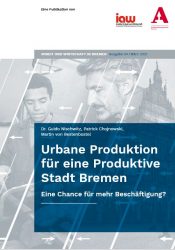 In a research project of the iaw, the conceptual foundations of urban production and the productive city were prepared with a view to the situation in Bremen and analysed in their impact structure. The study makes proposals for describing and recording urban production that is compatible with the city and embedding it in an urban development policy model of a productive city. On the basis of seven reference cities (Vienna, Zurich, Stuttgart, Hamburg, Frankfurt am Main, Wuppertal, Bochum), corresponding activities were filtered out and their transferability to the city of Bremen was examined. In the city of Bremen, eight locations and neighbourhoods (including the Tabakquartier and Kellogg-Areal) were examined with regard to their potential for implementing a productive city.
In a research project of the iaw, the conceptual foundations of urban production and the productive city were prepared with a view to the situation in Bremen and analysed in their impact structure. The study makes proposals for describing and recording urban production that is compatible with the city and embedding it in an urban development policy model of a productive city. On the basis of seven reference cities (Vienna, Zurich, Stuttgart, Hamburg, Frankfurt am Main, Wuppertal, Bochum), corresponding activities were filtered out and their transferability to the city of Bremen was examined. In the city of Bremen, eight locations and neighbourhoods (including the Tabakquartier and Kellogg-Areal) were examined with regard to their potential for implementing a productive city.







